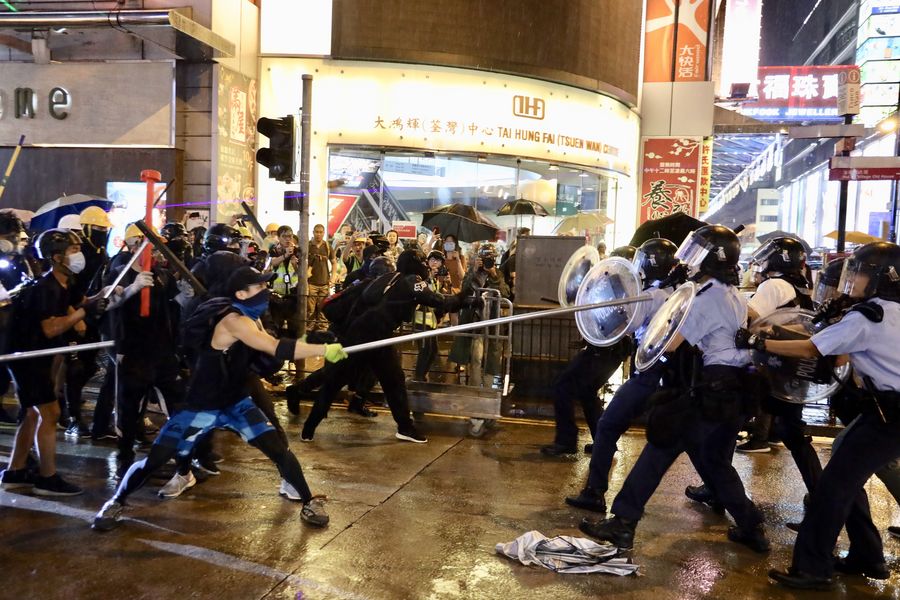
File photo of radical protesters attacking police officers in Tsuen Wan, the western New Territories of south China's Hong Kong. /Xinhua
The Office of the Commissioner of the Chinese Foreign Ministry in the Hong Kong Special Administrative Region (HKSAR) on Monday urged the Foreign Correspondents' Club (FCC) in Hong Kong to stop defaming the implementation of the national security law in Hong Kong under the pretext of freedom of the press.
A spokesperson for the commissioner's office expressed strong dissatisfaction and firm opposition to an FCC statement that groundlessly accused the national security law and the Hong Kong police's enforcement of the law, and beautified the crimes of Jimmy Lai Chee-ying and others.
The bad apple
All are equal before the law. The media mogul is not an exception.
According to Hong Kong police and local media, Jimmy Lai, founder of Apple Daily, and eight others were arrested Monday morning on suspicion of breaching the national security law for the HKSAR.
Local newspaper Apple Daily has played a role in instigating hatred, spreading rumors and smearing Hong Kong authorities and the mainland for years.
It has also played an active role in inciting anti-government riots as it is backed and funded by foreign forces to bring about a "color revolution" in the city, experts said.
No one has privileges above the law, said the spokesperson, adding that Jimmy Lai openly colluded with external forces to carry out activities endangering national security, deliberately undermining Hong Kong's prosperity and stability, and damaging the fundamental interests and well-being of Hong Kong residents, which has hindered the steady and sustained development of "One Country, Two Systems" and the long-term stability of Hong Kong.
The FCC hastily jumped out to exonerate Lai, helping and collaborating with anti-China forces to mess up Hong Kong, the spokesperson added.
A safer Asian Pearl
Hong Kong reached a significant turning point on June 30 as a law on safeguarding national security came into force. Over one month after the promulgation, people in the financial hub "generally feel safer."
During the prolonged social disturbances last year, innocent residents being attacked and metro stations, banks and stores being trashed were common occurrences. A man was set on fire by rioters for criticizing their vandalism, and a senior street cleaner died after being hit on his head with a brick thrown by someone in a mob.
"After the law was promulgated, people generally feel safer as their personal and property safety can be well protected," said Shi Zhu, chairman of the China Culture Foundation.
Besides personal safety, the national security law also protects Hong Kong residents' rights and freedoms in accordance with law, including freedom of the press.
The FCC has been operating in Hong Kong for nearly 70 years and should know well that freedom of the press in Hong Kong is guaranteed, said the spokesperson.
"At the same time, we should also understand that there has never been an absolute freedom of the press that is above the law in the world. No one should engage in activities that interfere in China's internal affairs and undermine China's security and HKSAR's stability under the guise of the freedom of the press," the spokesperson said, adding that one must abide by the laws and regulations, including the national security law, in the HKSAR.
The spokesperson stressed that Hong Kong police, in accordance with the national security law and local laws, have taken actions against instigators of Hong Kong riots and safeguarded national security and Hong Kong's social stability.
"We firmly support the Hong Kong police in strictly enforcing the law and firmly oppose any external interference in Hong Kong affairs. The FCC should respect the facts, recognize right and wrong, and stop denigrating the implementation of the national security law under the guise of the freedom of the press," the spokesperson said.


